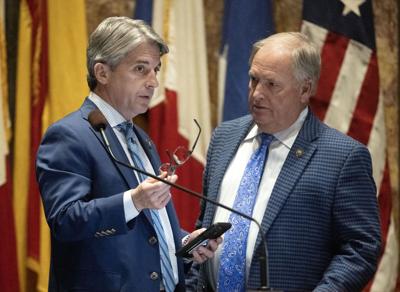State lawmakers advanced a bill Wednesday that would offer all Louisiana families public money for private school — a proposal that could eventually cost more than $500 million annually, according to one analysis.
Backed by Gov. Jeff Landry and the state Board of Elementary and Secondary Education, the bill would allow parents to apply for stipends ranging from $5,100 to $15,000 per year to pay for private school or other education expenses. All families, regardless of financial need, would eventually be eligible for the publicly funded stipends.
State Sen. Rick Edmonds, R-Baton Rouge, who sponsored the bill, said it would empower parents and shake up Louisiana’s education system, which historically has ranked near the bottom nationally. The bill, SB 313, would create publicly funded “education savings accounts,” or ESAs, stipends parents could spend on tuition, tutoring, online classes and more.
“We need a dramatic change — and this is what this program will do,” said Edmonds, who chairs the Senate Education Committee. After he amended his bill Wednesday to match a corresponding House bill, the committee voted 5-2 to send it to the full Senate.
But critics at the hearing questioned why the state would subsidize private education for families who can afford to pay tuition or live near high-performing public schools. They also said the state should hold private schools that receive tax dollars to the same standards as public schools.
Steven Procopio, president of the Public Affairs Research Council of Louisiana, an independent policy research group, also raised fiscal concerns. He estimated that 120,000 students could apply for stipends after the program had been in operation for five years or so, bringing the cost to $520 million annually.
“That's a lot of money,” he told lawmakers.
The ESA program would replace the private-school vouchers that Louisiana currently offers low-income families whose children attend low-rated schools. The state spent about $45 million on vouchers for just over 6,000 students this school year.
The Legislature’s fiscal office has not yet put a price on either ESA bill, so Procopio was the only person Wednesday to float a cost estimate. His projection assumes that 80% of the roughly 116,000 students who already attend private school would eventually apply for stipends after the program phases in and families and schools learn about it. Additional families would move their children from public to private schools.
He said he doubts the Legislature would fund stipends for everyone who applies, so he urged lawmakers to distribute the money according to family need.
Edmonds did not address the ESA program's ultimate cost, but said stipends would be awarded first-come, first-served. He also said the program would phase in over three years, with all families eligible for stipends in fall 2027. The stipends would be issued on a sliding scale, he added, with about $5,100 for higher-income families, $7,500 for low-income families and $15,000 for students with disabilities.
Sen. Katrina Jackson-Andrews, D-Monroe, said she was concerned the private-school subsidies would leave public schools with fewer students and less funding. She also questioned why families who are zoned for top-rated public schools should receive tax dollars to pay for private school.
“You could be right across the street from an 'A' school and you could take this ESA?” she asked. If a public school is performing well, she said, “I thought that's when we reward them, not begin to pull money away from them.”
Edmonds and Julie Emerson, R-Carencro, who sponsored the House ESA bill, HB 745, said they expect few parents in high-performing public schools would apply for stipends. But they added that even the best schools might not be able to meet every student’s needs.
Proponents also argued that families should decide where their education taxes go. Gene Mills, president of the Family Forum, a conservative research and advocacy group, said parents “who by force of the law and police power of the state have paid taxes” should expect “a return on that investment."
“This is their money,” he said. Other ESA supporters said the program would give students a path out of failing public schools.
But Dannie Garrett, executive counsel for the Louisiana School Boards Association, noted that the statewide score for public schools last year based on student achievement data was was nearly 79, or a B. By contrast, private schools that accepted vouchers and received state ratings earned an average score of 52 — just above an F.
Unlike the voucher program, the ESA bills would not require private schools to administer the same annual test as public schools, making comparisons difficult.
“We're never going to know how well those dollars were spent if we're not able to compare the same thing,” Garrett told lawmakers.
The House Education Committee is expected to vote on Emerson’s ESA bill next week.

